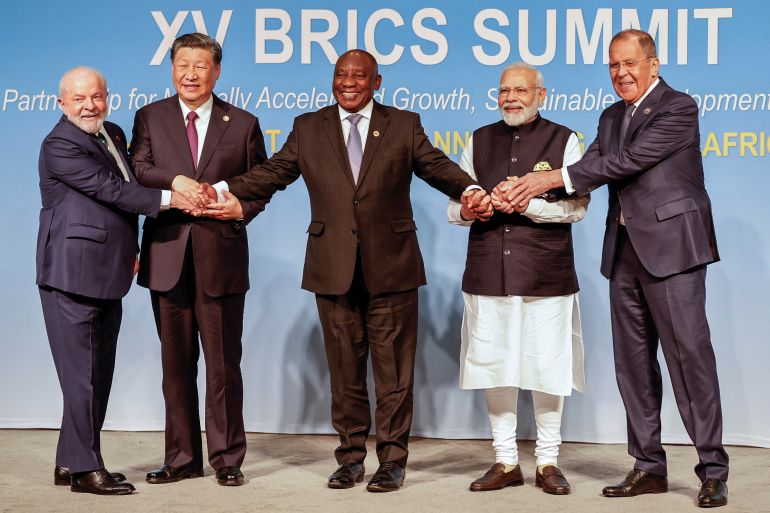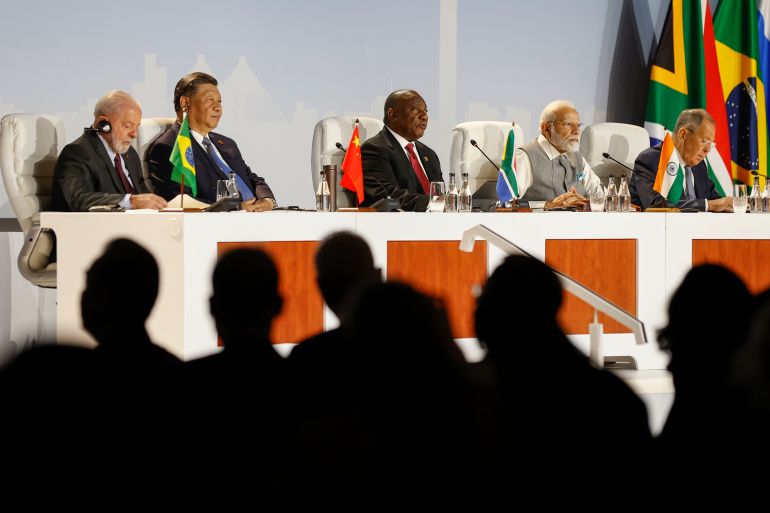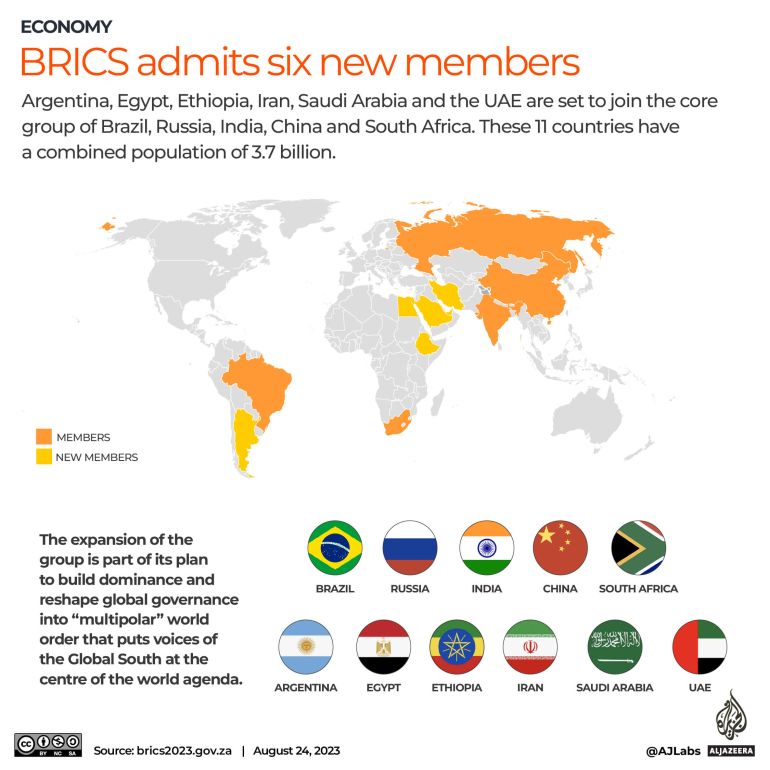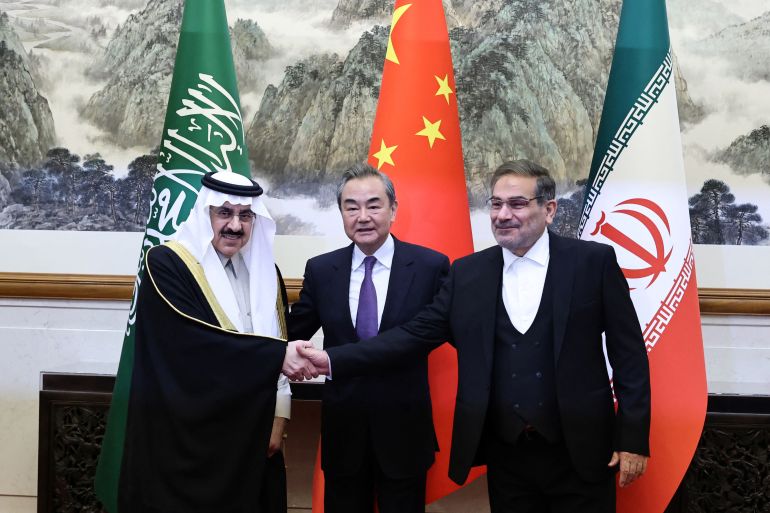Argentina, Egypt, Ethiopia, Iran, Saudi Arabia and the UAE have been invited to join the grouping of top emerging economies in January 2024.

Johannesburg, South Africa – The BRICS bloc of top emerging economies have taken a major step in expanding its reach and influence with the announcement that six more nations have been invited join as new members.
Argentina, Egypt, Ethiopia, Iran, Saudi Arabia and the United Arab Emirates have been invited to join as full members from January 1 next year.
The bloc, which was formed in 2009 with Brazil, Russia, India and China, first expanded to admit South Africa in 2010.
Now, it is says it is seeking to grow a stronger coalition of developing nations who can better put the interests of the Global South on the world’s agenda.
Before the start of its annual summit in South Africa this week, more than 40 countries had expressed interest in joining BRICS, and 23 formally applied to join.
“We appreciate the considerable interest shown by countries of the Global South in membership of BRICS,” the bloc said in the Johannesburg II declaration it adopted on the final day of the summit on Thursday.

‘Significant states’
“It is hard to find commonalities among the six countries invited to join BRICS other than that they are each significant states in their region,” Danny Bradlow, a professor with the Centre for the Advancement of Scholarship at the University of Pretoria, told Al Jazeera.
With the inclusion of Saudi Arabia, Iran, UAE and Egypt, “you could argue it’s very Middle East centric”, according to Sanusha Naidu, a senior research fellow at the Institute for Global Dialogue, a South African think tank focusing on China and Africa.
“This has geo-economic, geostrategic and geopolitical implications,” Naidu argued, saying the latest additions will push some BRICS nations to think more about their Middle East policies, and for China and India to beef the existing policies.
China recently brokered the re-establishment of ties between Saudi Arabia and Iran, a role that would traditionally have been filled by a country like the United States.
India’s recently signed an agreement with the UAE to trade in Indian rupees and Emirati dirhams instead of in the US dollar.
When selecting new members, the bloc may have taken into consideration the pricing of energy products, and how their countries can reduce their liability and vulnerability in terms of the cost of oil, she said.
“Besides Russia, all of [the core BRICS countries] are non-energy producing countries. They need to be able to make their economies function, but they don’t want to get caught in the secondary collateral damage of sanctions,” she explained.
The use of “unilateral sanctions” against countries and the continued dominance of the US dollar in global trade is something BRICS has vocally challenged.
The expansion “opens up new avenues for trade”, said Karin Costa Vasquez, a non-resident senior fellow at the Center for China and Globalization in Beijing.
“This shift could increase the potential for using currencies other than the US dollar, particularly by creating a network of countries that enhances the utility of their respective currencies.”

Inclusion
Analysts have said that one of the countries that could benefit from a trading regime outside of dollar dominance is Iran.
“Iran will clearly benefit the most,” said Na’eem Jeenah, a senior researcher at the South African think tank, Mapungupwe Institute for Strategic Reflection.
He said its inclusion “highlights the fact that it’s not as politically isolated as the US wants it to be”.
Inclusion could also be an “economic lifeline” due to increased bilateral trade.
Jeenah added that Argentina was a “shoe-in” as its inclusion was championed by Brazil, China and India. Among the African states, he said analysts expected Algeria, which has oil reserves, or Nigeria, which is the continent’s most populous country and leading economy, could have been included.
Cheta Nwanze, a partner at SBM Intelligence, a geopolitical advisory that focuses on West Africa, said of Nigeria’s exclusion, “I think it’s an indictment of our foreign policy, or the lack of it thereof. We used to be very pan-African in our foreign policy, that has changed”.
“One thing that is very clear is that most of the rest of Africa – with the exception of maybe Nigeria and Kenya – are moving away from the West and towards the East. We are sticking in the Western camp without saying it explicitly, but more importantly without getting any benefits from being in the Western camp,” he told Al Jazeera.
Jeenah said the inclusion of Ethiopia, a country with one of the fastest-growing economies, that also hosts the headquarters of the African Union, “makes sense in those terms”.
But Saudi Arabia, in particular, is “positioning” itself in a way that shows it is not just in the American camp.
“They have other options now and are going to leverage these options,” he said, such as the China-brokered agreement to restore ties with Iran.

‘Your problems are not our problems’
Analysts have remained undecided on what an expanded BRICS says to the West and means for the current global order, however.
“The grouping now represents a larger share of the world’s population and economy. However, this only means that the group is potentially a powerful voice for reform of the arrangements for global governance and a powerful actor in these arrangements,” Bradlow said.
“Whether it actually becomes such a voice will depend on whether the expanded group is more effective than the BRICS have been in forging agreements on how the arrangements for global governance should be reformed and how they can more effectively serve the interests of the whole Global South.”
“It says, ‘You can have a problem with them, we’ll keep them here.’ And it also says, ‘Your problems are not our problems.’”
She remarked that South Africa, which has important ties with the US, may have to deal with the “fallout” and navigate some of these tensions. But she also wondered whether the country could use the fact that it is in the bloc to its advantage.
“Yes, they don’t have the economic muscle to do what they want to do, but they have the strategic muscle to say ‘I have the BRICS behind me now, I have a wall of BRICS.’”
Jeenah said, “We must be careful about attributing more importance to this expansion development than it actually has … it certainly does not make BRICS into a Global South front. It’s just a club of 11 members.”
“More scary [for the West] than the six who were chosen is that 40 expressed interest in joining,” he said. “BRICS is engaging in incremental expansion … So where does it go in 30 years time?
“While hype of de-dollarisation isn’t on the horizon, the fact is that in a few years time, two of three largest economies in the world could be trading with each other within the [BRICS] bloc without the US dollar, that would be cause for some concern.”









